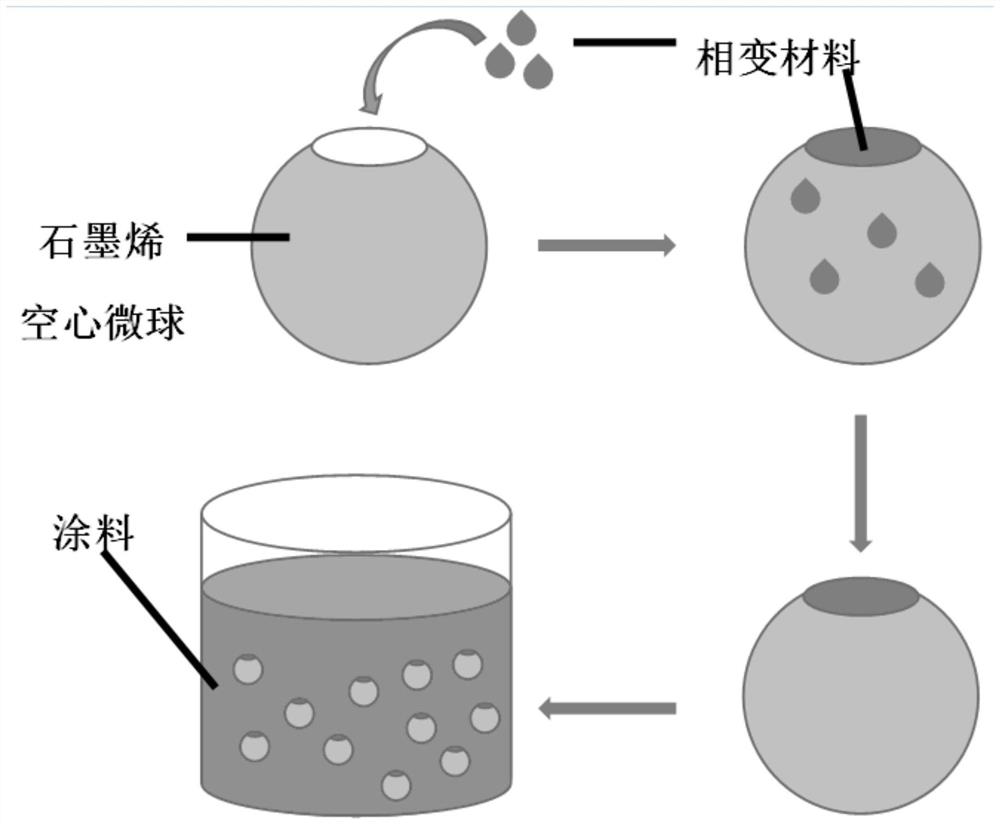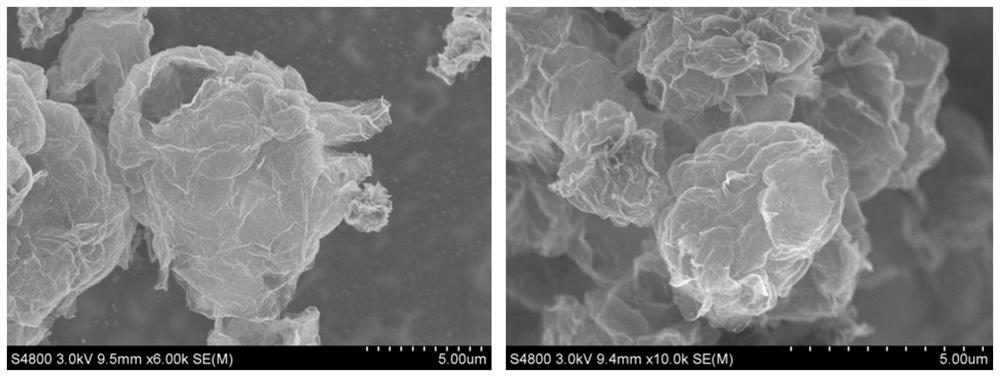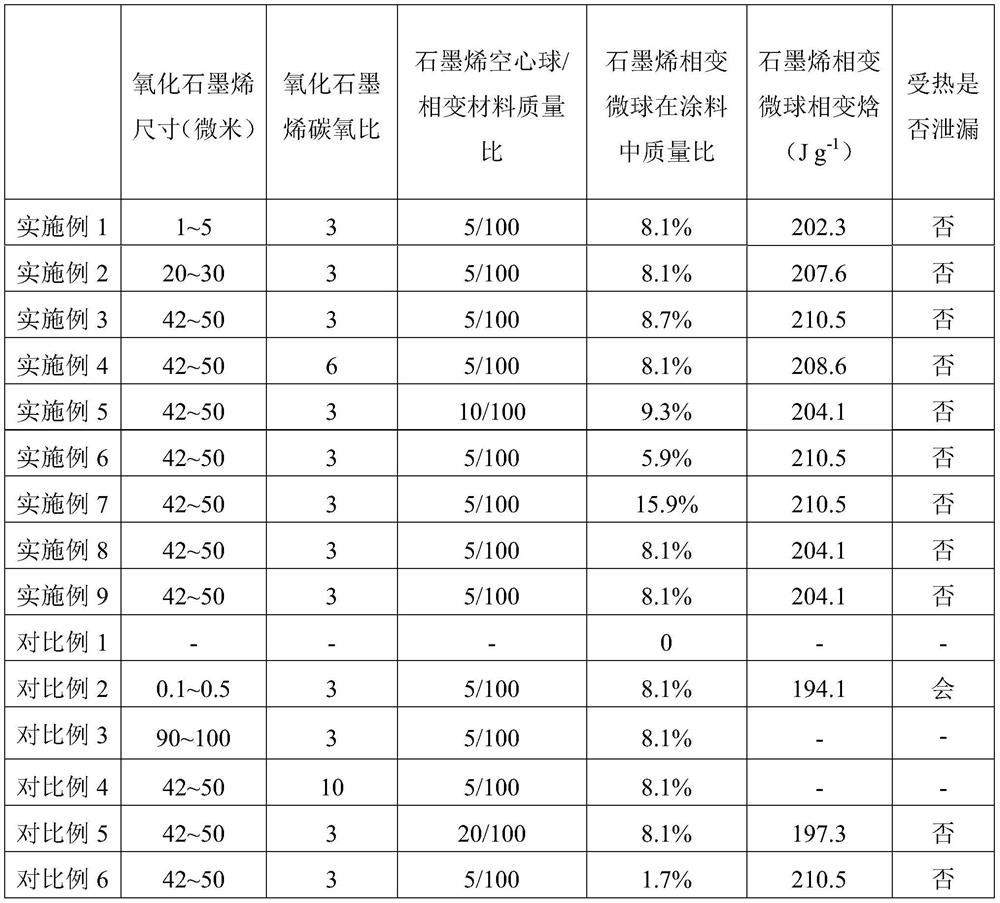A kind of phase change thermoregulation paint and preparation method thereof
A technology of phase change materials and coatings, applied in the direction of conductive coatings, antifouling/underwater coatings, coatings, etc., can solve the problem that the phase change performance has not been improved, it is difficult to ensure the effective coating of phase change materials, and the thermal conductivity of materials cannot be improved And other issues
- Summary
- Abstract
- Description
- Claims
- Application Information
AI Technical Summary
Problems solved by technology
Method used
Image
Examples
Embodiment 1
[0027] (1) Dry the single-layer graphene oxide dispersion liquid with a size of 1 to 5 microns by an atomization drying method to obtain graphene oxide microspheres with a carbon-oxygen ratio of 3. The atomization drying temperature is 130°C.
[0028] (2) Place the graphene oxide microspheres obtained in step (1) in a tube furnace, raise the temperature at 10° C. / min to 1300° C., and keep the temperature for 1 hour to obtain graphene hollow microspheres.
[0029] (3) Mix 100 parts by mass of eicosane and 5 parts by mass of graphene hollow microspheres, heat to 40°C to melt the eicosane and stir well for 30min, leave it to stand for 1h in vacuum, and then press filter at 50°C. After cooling, graphene phase change microspheres are obtained.
[0030] (4) Add 30 parts of styrene-acrylic emulsion, 0.3 parts of sodium polyphosphate, 70 parts of titanium dioxide, 180 parts of water and 25 parts of graphene phase change microspheres into the reactor for stirring; then add 1 part of defoamer...
Embodiment 2
[0033] (1) Dry the single-layer graphene oxide dispersion with a size of 20-30 microns by an atomization drying method to obtain graphene oxide microspheres with a carbon-oxygen ratio of 3. The atomization drying temperature is 130°C.
[0034] (2) Place the graphene oxide microspheres obtained in step (1) in a tube furnace, raise the temperature at 10° C. / min to 1300° C., and keep the temperature for 1 hour to obtain graphene hollow microspheres.
[0035] (3) Mix 100 parts by mass of eicosane and 5 parts by mass of hollow graphene microspheres, heat to 40°C to melt the eicosane and stir well for 60 minutes, leave it to stand for 1 hour in vacuum, and then filter at 50°C. After cooling, graphene phase change microspheres are obtained.
[0036] (4) Add 30 parts of styrene-acrylic emulsion, 0.6 parts of sodium polyphosphate, 70 parts of titanium dioxide, 180 parts of water and 25 parts of graphene phase change microspheres into the reactor for stirring; then add 0.5 parts of defoamer, ...
Embodiment 3
[0039] (1) Dry the single-layer graphene oxide dispersion with a size of 42-50 microns by an atomization drying method to obtain graphene oxide microspheres with a carbon-oxygen ratio of 3. The atomization drying temperature is 130°C.
[0040] (2) Place the graphene oxide microspheres obtained in step (1) in a tube furnace, raise the temperature at 10° C. / min to 1300° C., and keep the temperature for 1 hour to obtain graphene hollow microspheres.
[0041] (3) Mix 100 parts by mass of eicosane and 5 parts by mass of graphene hollow microspheres, heat to 40°C to melt the eicosane and stir well for 20min, leave it to stand for 1h in vacuum, and then press filter at 50°C. After cooling, graphene phase change microspheres are obtained.
[0042] (4) Add 30 parts of styrene-acrylic emulsion, 0.3 parts of sodium polyphosphate, 60 parts of titanium dioxide, 170 parts of water and 25 parts of graphene phase change microspheres into the reactor for stirring; then add 1 part of defoamer, 2 par...
PUM
| Property | Measurement | Unit |
|---|---|---|
| particle diameter | aaaaa | aaaaa |
| phase transition temperature | aaaaa | aaaaa |
| size | aaaaa | aaaaa |
Abstract
Description
Claims
Application Information
 Login to View More
Login to View More - Generate Ideas
- Intellectual Property
- Life Sciences
- Materials
- Tech Scout
- Unparalleled Data Quality
- Higher Quality Content
- 60% Fewer Hallucinations
Browse by: Latest US Patents, China's latest patents, Technical Efficacy Thesaurus, Application Domain, Technology Topic, Popular Technical Reports.
© 2025 PatSnap. All rights reserved.Legal|Privacy policy|Modern Slavery Act Transparency Statement|Sitemap|About US| Contact US: help@patsnap.com



